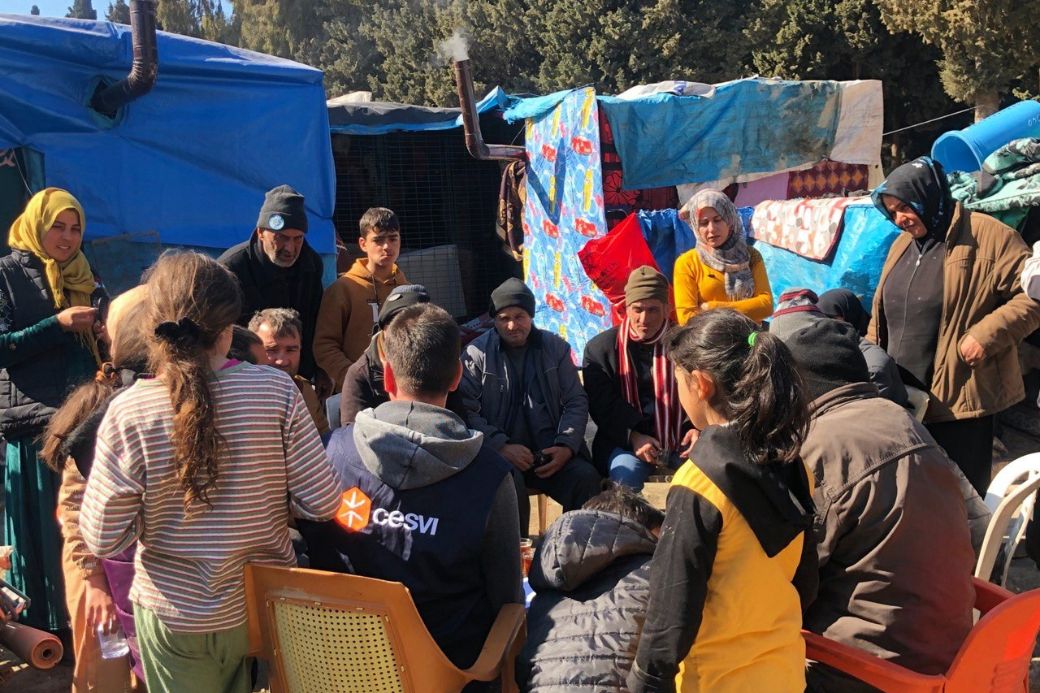1 million people have nowhere to go back to.
Help is urgently needed. Continue to support us by donating here.
“The crisis in the areas hit by the earthquake will go well beyond the three-month state of emergency that has been declared: it is essential to provide long-term material and psychological aid”. Raising the alarm is Lorena D’Ayala Valva, Deputy General Manager and Head of Emergency Unit of CESVI, which is particularly active in the Turkish provinces of Kahramanmaraş and Adiyaman, among those most devastated but least reached by international aid. “In the ten Turkish provinces hardest hit by the earthquake,” she adds, “there were 13.5 million people living: over 2.2 million have been displaced elsewhere, but for those who remain there is an urgent need for aid and shelter in this freezing winter. Adding to the psychological trauma of the tragedy is the risk of serious illnesses, from respiratory diseases to cholera. Over the next six months, we will reach 25,000 people on various fronts, from the distribution of life-saving goods to psychological assistance for adults and children”.
Ten days after the 6 February earthquake in Türkiye, while another 3,170 tremors also shook parts of Syria, 105,505 injured people were pulled from the rubble and one million people were left homeless, with 211,000 homes in 5,733 buildings being demolished in the 10 worst-affected Turkish governorates (IBC, 2023). While the dead now exceed 46,000 in the two countries, a figure set to increase as thousands of victims are still under the rubble.
WE of CESVI have immediately intervened with NGO partners in the Alliance2015 European network, which is concentrating its efforts on providing: life-saving goods, hygiene kits (soap, tissues, sanitary pads and nappies), construction of public toilets and psychological assistance.
In the early stages of the response in Türkiye, at least 3,000 tents will house some 15,000 people, with a special focus on those most vulnerable and at risk, such as women, people with disabilities and the elderly. The provision of mattresses, blankets, LED lights and cooking kits will also be coordinated, equipping shelters and informal centres. Given the sub-zero temperatures, heating is one of the most critical needs at the moment, so available heating solutions including electric stoves will be distributed. Toilets will also be set up and operated in at least 250 locations, providing access to approximately 5,000 people (including those with disabilities).
Coordinating two local organisations and training staff on the ground, we will also deploy two mobile units for psychological assistance to people affected by trauma and other common psychological issues after earthquakes (loss of loved ones, trauma related to having lost a home, being under rubble, etc.). Specialists will provide counselling and support services to both adults and children, in groups and individually. For children, animators will also propose play and recreational activities to help them cope with the tragedy they have experienced.
In Syria, emergency assistance will be provided to repair critical water and sanitation infrastructure in the Aleppo and Idleb areas.
In the meantime, the activities will be accompanied by training for the inhabitants, to make them aware of the risks they would run by returning to their homes, as the risk of new tremors and the collapse of buildings remains high. Residents are sleeping in their cars or sheltering in tents in front of their old houses in all the most affected provinces.
